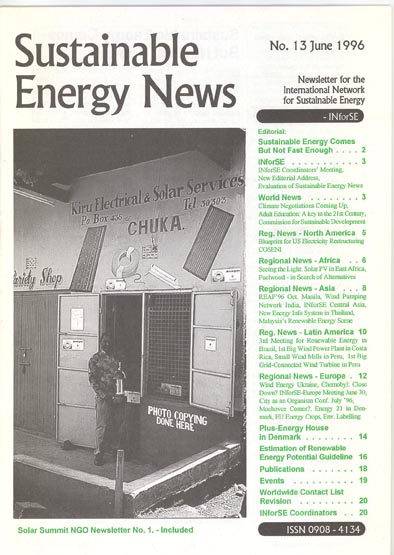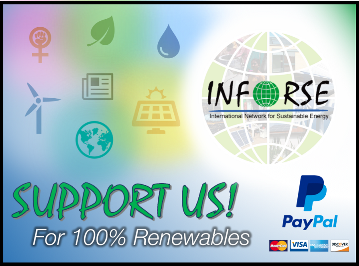|
|
|
|
|
|
|
|
|
|
|
|
|
|
|
|
|
|
|
|
|
| Follow Us: |
| Fuelwood - in Search of Alternatives | |
| By Svend Erik Ladefoged, INforSE Secretariat | |
|
During a recent visit to Zimbabwe, Tanzania, and Uganda, I had firsthand experience of the fuelwood crisis afflicting many rural families. In many places, they are rapidly reaching the stage when there will not be enough wood for cooking purposes and for space heating. Why is this? |
|
| Oil Crisis & Biomass fuels | |
|
First, until the late 1970s, nobody considered the energy consumption of the rural populations. At the time of the independence of the countries, energy planning was of relatively minor concern. The interest therefore centred around electricity, oil, gas, and coal. The large rural populations did not figure in these considerations. It was not until the shocks of the oil price increases in 1973-74 and again in 1978-80 that attention was paid to the <%-2>energy supply and consumption of rural populations. New studies found that the major supply of energy in these countries came from biomass fuels in the form of wood and charcoal. Second, one of the myths is that it is mainly the rural populations' use of wood for cooking purposes that has caused the shortages now experienced. Several studies have found that the reasons for the depletion of wood stocks, particularly in rural areas, have to be found in (1) cutting of trees in order to extend agricultural lands, (2) increase in the population, (3) rapid urbanisation, and the subsequent increased needs of the poor masses in the cities for wood charcoal for cooking (4) increased prices of modern fuels. To remedy the situation, agroforestry, intercropping, and the establishment of wood belts around the cities were tried, but have met with disappointing results. At the same time, agricultural wastes are often lying about without being used. To mention a few: husks from rice and coffee, maize cobs, stems from different plants etc., and sawdust from sawmills. Many of these wastes may be briquetted or carbonised and used either as fodder for animals (some types of agricultural wastes are already being used in this way), or as alternatives for wood or wood charcoal. In this way the felling of trees in rural areas could be significantly reduced. |
|
| Charcoal from Husks | |
|
"Black Power", a small Ugandan company, has spent the last 10 years developing charcoal made from coffee husks. Their simple, homemade machinery shows that it is possible to produce alternatives to wood charcoal inexpensively. Another alternative is dried grass burned in a simple, cheap stove resembling the well known improved charcoal stove (jiko). Last, in many places sawdust is burned off as a waste product. But, sawdust is perfectly suitable for burning in simple stoves. Judging by conditions in places in Tanzania and Uganda, it would appear that the common feature of these types of alternative fuels is that they are as efficient as or better than wood charcoal. Furthermore, the indications were that financially these fuels compare well with wood charcoal, when their efficiency is taken in to consideration. Economically, a shift to alternatives or even substitutes for wood or charcoal made from wood will be hard hitting on the many rural households that produce charcoal for the cities. To offset the impact, these families may instead sell/export "processed" (made into briquettes or charcoal) agricultural waste products to the cities. Such solutions need to be further investigated and developed. The aims should be to (1) assure that competitive uses of the agricultural wastes are avoided within the rural farming community, i.e., that these wastes are not already being used by the farmers for other purposes, and (2) identify other types of waste products that can be used as substitute fuels, particularly to wood charcoal. Last, but not least, the economical feasibility needs to be analysed. |
|

| |
| Published in Sustainable Energy News |
|
|
Go back to main page of ISSUE #13 Sustainable Energy News (16 pages) (1996-06-30) 
|
|
| Contact | |
| |
INFORSE Secretariat Klosterport 4F, 1. floor DK-8000 Aarhus C Denmark Phone: +45 86 22 70 00 Twitter: INFORSE_org Facebook: INFORSE Web: inforse.org E-mail: ove@inforse.org |
